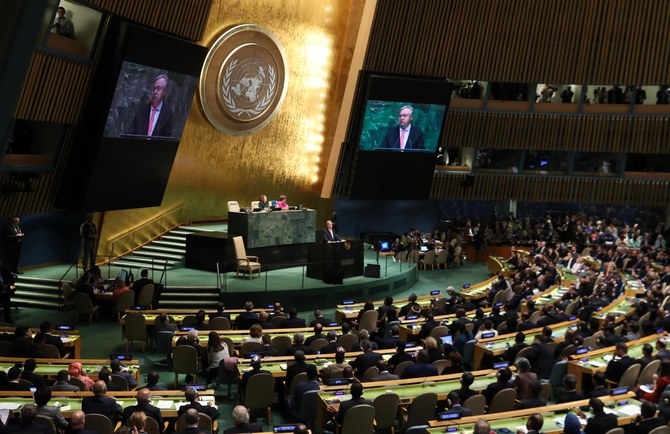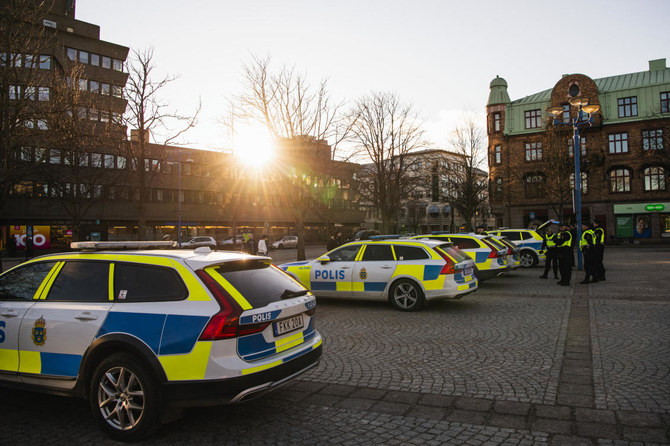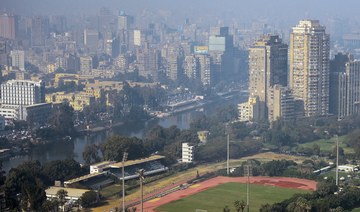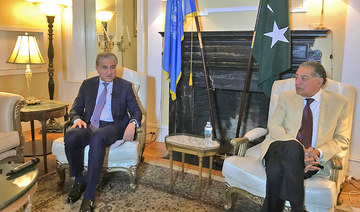NEW YORK: In person and on screen, world leaders return to the United Nations foremost gathering for the first time in two years on Tuesday with a formidable, diplomacy-packed agenda of escalating crises to tackle, including the still-raging COVID-19 pandemic and a relentlessly warming planet.
Other pressing issues include rising US-China tensions, Afghanistan’s unsettled future under its new Taliban rulers and ongoing conflicts in Yemen, Syria and Ethiopia’s embattled Tigray region.
Last year, no leaders came to the UN because the coronavirus was sweeping the globe, so all addresses were pre-recorded. This year, the General Assembly offered leaders a choice — come to New York or remain online. More than 100 decided to appear in person in the General Assembly hall.
UN Secretary-General Antonio Gutteres, who opens the weeklong event, “will pull no punches in expressing his concern about the state of the world, and he will lay out a vision to bridge the numerous divides that stand in the way of progress,” UN spokesman Stephane Dujarric said. Guterres has already demonstrated that in pointed pre-meeting remarks about the virus and climate change.
By tradition, the first country to speak is Brazil, whose president, Jair Bolsonaro, isn’t vaccinated. He reiterated last Thursday that he doesn’t plan to get the shot any time soon, justifying his refusal by saying he had COVID-19 and therefore has a high level of antibodies.
A key issue ahead of the meetings has been COVID-19 entry requirements for leaders to the United States — and to the UN headquarters itself. The US requires a vaccination or a recent COVID-19 test, and the UN will operate on an honor system whereby anyone entering the complex attests that they do not have symptoms and have not tested positive in the last 10 days.
The three most closely watched speakers on Tuesday morning are expected to be US President Joe Biden, appearing at the UN for the first time since his defeat of Donald Trump in the US election last November; Chinese President Xi Jinping, who in a surprise move will deliver a video address; and Iran’s recently elected hard-line President Ebrahim Raisi.
Ahead of the opening of the General Assembly’s annual General Debate, Guterres issued a dire warning that the world could be plunged into a new and probably more dangerous Cold War unless the United States and China repair their “totally dysfunctional” relationship.
The UN chief said in an interview this weekend with The Associated Press that Washington and Beijing should be cooperating on the climate crisis and negotiating on trade and technology, but “unfortunately, today we only have confrontation” including over human rights and geostrategic problems mainly in the South China Sea.
Speaking last week about Biden’s speech, Richard Gowan, UN director of the International Crisis Group, said “the really significant question is exactly how he frames relations with China.” He predicted that Biden “won’t be as forthright in criticism of China as Trump was, especially in 2019 and 2020,” but rather will “try and cast China as a country that is challenging the rules-based world order and a country that should not be trusted with leadership of the international system.”
On the latest speakers list released earlier this month, China’s speech was supposed to be delivered on Friday by a deputy prime minister. But the UN confirmed Monday that Xi will give the country’s video address instead. His speech and any comments about the US rivalry are certain to be closely watched and analyzed: China’s presence in the world, and its relationship with the United States, affect most every corner of the planet.
Other leaders scheduled to speak in person during the meeting, which ends Sept. 27, include King Abdullah II of Jordan, the president of Venezuela, and the prime ministers of Japan, India and the United Kingdom along with Israel’s new Prime Minister Naftali Bennett and Palestinian President Mahmoud Abbas.
Leaders delivering prerecorded statements this year include the presidents of Egypt, Indonesia, South Africa and Zimbabwe. French President Emmanuel Macron was supposed to deliver a pre-recorded statement on Tuesday, but the government said Foreign Minister Jean-Yves Le Drian will now deliver the country’s address virtually on the final day.
France and China have reacted angrily to the surprise announcement by Biden, alongside the leaders of Australia and Britain, of a deal to provide Australia with at least eight nuclear-powered submarines. Australia had signed a contract worth at least $66 billion for a dozen French conventional diesel-electric submarines and their construction was already under way.
Le Drian told a news conference Monday that there is a “crisis of trust” between the United States and its oldest ally, France, as well as Europe, which has been excluded from the new US-UK-Australia alliance focused on the Indo-Pacific and aimed at confrontation with China. He said Europeans “should not be left behind,” and need to define their own strategic interests.
World leaders return to UN and face many escalating crises
https://arab.news/cfy9k
World leaders return to UN and face many escalating crises

Belgium’s Ghent university severs ties with three Israeli institutions

Pro-Palestinian protesters in Ghent have been protesting against Israel’s military offensive in Gaza and have been occupying parts of the university since early this month.
The university’s rector, Rik Van de Walle, said in a statement that ties were being cut with Holon Institute of Technology, MIGAL Galilee Research Institute, and the Volcani Center, which carries out agricultural research.
“We currently assess these three partners as (very) problematic according to the Ghent University human rights test, in contrast to the positive evaluation we gave these partners at the start of our collaboration,” Van de Walle said.
Partnerships with MIGAL Galilee Research Institute and the Volcani Center “were no longer desirable” due to their affiliation with Israeli ministries, an investigation by the University of Ghent found, and collaboration with the Holon Institute “was problematic” because it provided material support to the army for actions in Gaza.
A spokesperson for the university said the move would affect four projects.
The three Israeli institutions did not immediately comment.
The protesters told Belgian broadcaster VRT they welcomed the decision but regarded it as only a first step. They said they would continue their occupation of parts of the university “until UGent breaks its ties with all Israeli institutions.”
The actions mirror those of students in the United States and elsewhere in Europe, calling for an immediate permanent ceasefire and for schools to cut financial ties with companies they say are profiting from what they regard as the oppression of Palestinians.
Muslim professionals quit ‘hostile’ France in silent brain drain

PARIS: After being knocked back at some 50 interviews for consulting jobs in France despite his ample qualifications, Muslim business school graduate Adam packed his bags and moved to a new life in Dubai.
“I feel much better here than in France,” the 32-year-old of North African descent told AFP.
“We’re all equal. You can have a boss who’s Indian, Arab or a French person,” he said.
“My religion is more accepted.”
Highly-qualified French citizens from Muslim backgrounds, often the children of immigrants, are leaving France in a quiet brain drain, seeking a new start abroad in cities like London, New York, Montreal or Dubai, according to a new study.
The authors of “France, you love it but you leave it”, published last month, said it was difficult to estimate exactly how many.
But they found that 71 percent of more than 1,000 people who responded to their survey circulated online had left in part because of racism and discrimination.
Adam, who asked that his surname not be used, told AFP his new job in the United Arab Emirates has given him fresh perspective.
In France “you need to work twice as hard when you come from certain minorities”, he said.
He said he was “extremely grateful” for his French education and missed his friends, family and the rich cultural life of the country where he grew up.
But he said he was glad to have quit its “Islamophobia” and “systemic racism” that meant he was stopped by police for no reason.
France has long been a country of immigration, including from its former colonies in North and West Africa.
But today the descendants of Muslim immigrants who came to France seeking a better future say they have been living in an increasingly hostile environment, especially after the attacks in Paris in 2015 that killed 130 people.
They say France’s particular form of secularism, which bans all religious symbols in public schools including headscarves and long robes, seems to disproportionately focus on the attire of Muslim women.
Another French Muslim, a 33-year-old tech employee of Moroccan descent, told AFP he and his pregnant wife were planning to emigrate to “a more peaceful society” in southeast Asia.
He said he would miss France’s “sublime” cuisine and the queues outside the bakeries.
But “we’re suffocating in France”, said the business school graduate with a five-figure monthly salary.
He described wanting to leave “this ambient gloom”, in which television news channels seem to target all Muslims as scapegoats.
The tech employee, who moved to Paris after growing up in its lower-income suburbs, said he has been living in the same block of flats for two years.
“But still they ask me what I’m doing inside my building,” he said.
“It’s so humiliating.”
“This constant humiliation is even more frustrating as I contribute very honestly to this society as someone with a high income who pays a lot of taxes,” he added.
A 1978 French law bans collecting data on a person’s race, ethnicity or religion, which makes it difficult to have broad statistics on discrimination.
But a young person “perceived as black or Arab” is 20 times more likely to face an identity check than the rest of the population, France’s rights ombudsman found in 2017.
The Observatory for Inequalities says that racism is on the decline in France, with 60 percent of French people declaring they are “not at all racist”.
But still, it adds, a job candidate with a French name has a 50 percent better chance of being called by an employer than one with a North African one.
A third professional, a 30-year-old Franco-Algerian with two masters degrees from top schools, told AFP he was leaving in June for a job in Dubai because France had become “complicated”.
The investment banker, the son of an Algerian cleaner who grew up within Paris, said he enjoyed his job, but he was starting to feel he had hit a “glass ceiling”
He also said he had felt French politics shift to the right in recent years.
“The atmosphere in France has really deteriorated,” he said, alluding to some pundits equating all people of his background to extremists or troublemakers from housing estates.
“Muslims are clearly second-class citizens,” he said.
Adam, the consultant, said more privileged French Muslims emigrating was just the “tiny visible part of the iceberg”.
“When we see France today, we’re broken,” he said.
North Korea fires ballistic missile, South Korea’s military says

- South Korea’s Joint Chiefs of Staff did not immediately provide details of the projectile or its trajectory
- North Korea has launched a range of ballistic and cruise missiles as well as tactical rockets in recent months
SEOUL: North Korea fired a ballistic missile toward the sea off its east coast, South Korea’s military said on Friday.
South Korea’s Joint Chiefs of Staff did not immediately provide details of the projectile or its trajectory.
North Korea has launched a range of ballistic and cruise missiles as well as tactical rockets in recent months, describing them as part of a program to upgrade its defensive capabilities.
Earlier on Friday, the powerful sister of North Korea leader Kim Jong Un said its tactical rockets were intended solely as a deterrent against South Korean military aggression, while denying that Pyongyang was exporting the weapons.
The missile launch comes at the same time as a visit by Russian President Vladimir Putin to the Chinese northeastern city of Harbin.
French police ‘neutralized’ armed person who tried to set fire to synagogue in Rouen — Darmanin

- The incident occurred early on Friday morning
PARIS: French police in Rouen shot dead an armed man who set fire to the city’s synagogue, Interior Minister Gerald Darmanin and local officials said on Friday.
The incident occurred in central Rouen, 130 kilometers northwest of Paris, early on Friday morning, Darmanin said in a post on social network X.
The attacker’s identity and motive were still unclear. He was carrying a knife and iron bar, according to local authorities.
France hosts the Olympic Summer Games in two months and recently raised its alert status to the highest level against a complex geopolitical backdrop in the Middle East and Europe’s eastern flank.
Elie Korchia, the president of France’s Consistoire Central Jewish worshippers body, said police had “avoided another anti-Semitic tragedy.”
Regional broadcaster France 3 said fire fighters were on the site. The fire had been brought under control, a Rouen city hall official said.
Rouen’s mayor said the Normandy town was ‘battered and shocked’.
The city in 2016 was rocked by an attack later claimed by the Islamic State, when a priest was killed with a knife during service in town of Saint-Étienne-du-Rouvray, in the southern part of Rouen’s urban agglomeration.
Suspected gunshots near Israeli embassy in Stockholm prompt police cordon

STOCKHOLM: Swedish police have detained several people and cordoned off an area in Stockholm after a patrol heard suspected gunshots, they said on Friday, with the Israeli embassy located in the closed-off area.
"A police patrol at Strandvagen in Stockholm heard bangs and suspected there had been a shooting," police said on their website, adding that the affected area lay between the capital's Djurgarden Bridge, its Nobel Park and the Oscar Church.
Several people have been detained and an investigation has been launched into a suspected serious weapons crime, they added.
"In connection with the ongoing forensic investigation, findings have been made that strengthen the suspicions that a shooting took place," police said on its website.
Reuters could not immediately reach police and the Israeli embassy for comment.
Swedish news agency TT said police declined to comment on whether there was a link between the incident and the Israeli embassy.




















